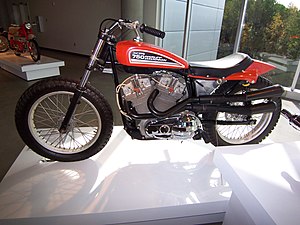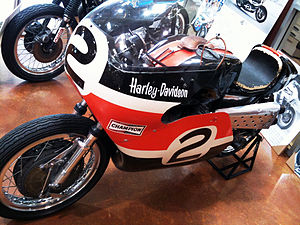Harley-Davidson XR-750

|
|
| Also called | 70-XR-750 |
|---|---|
| Predecessor | Model KR |
| Class | Dirt track racing |
| Engine | 748 cc (45.6 cu in) air cooled V-twin, 2x 36 mm Mikuni carburetors |
| Bore / stroke | 76 mm × 81 mm (3.0 in × 3.2 in) (1970 iron head) 79 mm × 76 mm (3.1 in × 3.0 in) (alloy head 1972– ) |
| Top speed | 115 mph (185 km/h) |
| Power | 82 hp (61 kW) @ 7,700 rpm |
| Transmission | Triple chain primary, 4-speed, chain final drive |
| Frame type | Steel twin loop full cradle |
| Suspension | Front: Ceriani telescopic fork Rear: 2x Girling shocks |
| Brakes | Front: none Rear: optional |
| Tires | Spoked wheels, aluminum rims. 4 in × 19 in (100 mm × 480 mm) |
| Rake, trail | 26°, 3.44 in (87 mm) |
| Wheelbase | 56.75 in (1,441 mm) |
| Seat height | 31 in (790 mm) |
| Weight | 295 lb (134 kg) (claimed) (dry) |
| Fuel capacity | 2.5 US gal (9.5 l; 2.1 imp gal) |
| Oil capacity | 2.75 US qt (2,600 ml) |
 |
|
| Also called | XRTT-750 |
|---|---|
| Class | Road racing |
| Engine | 748 cc (45.6 cu in) air cooled V-twin, 2x 36 mm Mikuni carburetors |
| Bore / stroke | 79 mm × 76 mm (3.1 in × 3.0 in) |
| Power | Est. 70–100 hp (52–75 kW) (early-late) |
| Transmission | Triple chain primary, 4-speed, chain final drive |
| Frame type | Steel twin loop full cradle |
| Suspension | Front: Ceriani telescopic fork Rear: 2x Girling shocks |
| Brakes | Front: 4 leading shoe drum Rear: single disc |
| Tires | Spoked wheels, aluminum rims. Front: 3 in × 18 in (76 mm × 457 mm) Rear: 3.5 in × 18 in (89 mm × 457 mm) |
| Rake, trail | 24°, 3.63 in (92 mm) |
| Wheelbase | 54 in (1,400 mm) |
| Seat height | 28 in (710 mm) |
| Weight | 324 lb (147 kg) (claimed) (dry) |
| Fuel capacity | 6 US gal (23 l; 5 imp gal) |
| Oil capacity | 4 US qt (3,785 ml) |
The Harley-Davidson XR-750 is a racing motorcycle made by Harley-Davidson since 1970, primarily for dirt track racing, but also for road racing in the XRTT variant. The XR-750 was designed in response to a 1969 change in AMA Grand National Championship rules that leveled the playing field for makes other than Harley-Davidson, allowing Japanese and British motorcycles to outperform the previously dominant Harley-Davidson KR race bike. The XR-750 went on to win the most races in the history of American Motorcyclist Association (AMA) racing.
The XR-750 is associated with the careers of racers Mark Brelsford, Cal Rayborn, and Jay Springsteen, and was the favorite motorcycle of stunt performer Evel Knievel. Knievel used the bike from December 1970 until his final jump in January 1977. An XR-750 was included in the 1998 The Art of the Motorcycle exhibition, and one of Knievel's bikes is in the Smithsonian's National Museum of American History America on the Move exhibit.
The AMA Grand National Championship Class C rules, introduced in 1933 and revised in 1954, had an equivalency formula limiting flathead, or sidevalve, engines to 750 cc (46 cu in) displacement, while more modern overhead valve (OHV) engines could be a maximum of only 500 cc (31 cu in). Over time, this displacement advantage kept the older flathead technology on the track and discouraged a broader field of competitors. At least 200 homologated examples of a model had to be built and made available to the public. The flathead Harley-Davidson KR series had dominated Class C racing, but by the late 1960s BSA, Norton and Triumph had little market for 500 cc OHV motorcycles, and there was increasing pressure for a single displacement, without reference to valve configuration. The public was buying 650 cc (40 cu in) and larger displacement British bikes, and they would prove to be competitive, given the chance.
...
Wikipedia
